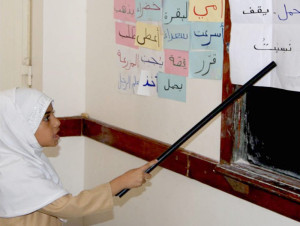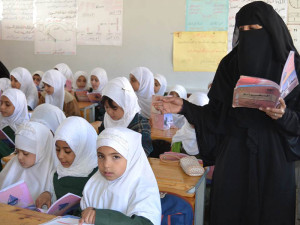In midst of conflict, Yemen reading program succeeds
By Jillian SlutzkerMarch 17, 2015
The daily routine of going to school brings a sense of stability to children, especially those living in poverty and crisis-affected environments.
For children in Yemen, this security hangs in the balance as conflict rages among Houthi rebels, Al Qaeda in the Arabian Peninsula and government forces. Keeping schools open and delivering quality education is now more critical than ever.
Where possible, keepings children in class and education programs running during crisis “actually gives people hope as they see normalcy in school continuing,” says Joy du Plessis, Education in Conflict expert at Creative Associates International.
Overcoming obstacles like a lack of rule of law in many places, restrictions on movement throughout the country, frequent street demonstrations and the departure of key government officials, the Yemen Early Grade Reading Approach program has continued and succeeded, says the program’s head Atia Moor. The program is funded by the U.S. Agency for International Development and implemented by Creative.
The program remains on track to deliver nationwide training and coaching to educators on its successful phonics-based reading methodology as part of the national scale-up of the reading program.

“I believe these programs are needed now more than ever,” says Moor, noting that some government agencies that deliver services have reduced capacity during times of political instability. “The need for social services needs to be met,” he says.
After Houthi rebels took complete control of the capital of Sana’a in January, President Abdu Rabbu Mansour Hadi resigned his post. In late February, he fled the capital and retracted his resignation.
Yet, while the central government is in many ways on the brink, the country’s Ministry of Education remains operational, says Moor, playing a lead role in the implementation and scale-up of the Yemen Early Grade Reading Approach.
With uncertainty prevailing in Sana’a and ongoing conflict around the country, Moor says that programs like this one “give hope to people that the next generation might have a brighter future.”
Primary school educators are looking to the future and anticipating gains in literacy from their students as the program progresses.
“I am sure that the primary education system in Yemen can count on the [Yemen Early Grade Reading Approach],” said one teacher at a recent refresher teacher training at the Saba School in Sana’a. “I am eager to see the results three years from now!”
Globally, the United Nations reports that an estimated 30 million children in emergency or conflict-affected areas are out of school due to the targeting of schools by armed groups, displacement or insecurity. In the past, over several years of internal conflict, Yemeni schools have been targeted by armed groups.
Success through instability
Even in the most stable of countries, increasing the capacity of national governments to sustain programs—and build on their gains—is a challenge, and these difficulties can be compounded by conflict, when ministries change hands and progress is interrupted.
However, the country’s ongoing crisis has not derailed the implementation of the Yemen Early Grade Reading Approach or set back the gains it made in the years and months prior to the present flare-up.
Through close partnerships with Ministry of Education officials at the governorate level, the Yemen Early Grade Reading Approach has continued to build national capacity and ensure that local-level trainings and coaching for master trainers, parents and teachers remain on track.
“During the present unrest, the training of literacy coaches is ongoing, children are going to school, teachers are teaching and our Yemeni staff as well as Ministry of Education officials are still going to work,” says du Plessis.

To date, more than 5,000 educators using the Yemen Early Grade Reading Approach have received coaching visits through the Ministry in Aden, Amant Al-Asimah Taiz, Amran, Abyan, Dhamar, Lah and Ibb governorates. These visits provide teachers with critical support, even in the middle of the conflict, and ensure that students are gaining the literacy skills they need for future success.
Using the Yemen Early Grade Reading Approach, educators are reporting renewed energy in the classroom and positive advances in students’ literacy levels.
“I was a teacher for 18 years and I can say confidently that [this program] is a revolutionary tool for students of this country,” said one Master Trainer during a refresher training at the Tokyo School in Sana’a. “Now I am a lead teacher and I have heard many success stories about this new approach to reading. This training gave us the power to keep the momentum going.”
Ensuring teacher coaching continues even after the life of the program, the Ministry of Education has accredited the program’s Supervision and Coaching Training Manual as the tool to be used for teacher support and supervision in all subjects nationwide.
This is a result of the program’s “excellent approach, simplicity of implementation and great impact,” says Abdullah Othman, Director of Teacher Capacity Building in the Training Sector at the Ministry of Education.
With support from the Yemen Early Grade Reading Approach program, the Ministry has, for the first time, implemented a nationwide awareness campaign on the importance of early grade literacy and orientated Ministry officials on the program’s plan and scale-up.
The Ministry has also taken the lead in printing and distributing Yemen Early Grade Reading Approach student books and teacher manuals for grade one teachers and students nationwide.
Aid needed more than ever
With the escalation of Yemen’s conflict particularly in the capital city, many embassies, including France, the United Kingdom and the United States, have closed their doors. This has raised fears that international aid to the country could also diminish, at a time when Yemeni children are increasingly vulnerable, the UN reports.
There are many operational obstacles for development programs working in this environment, says Moor, “in addition to the psychological effect the present situation may have on our local colleagues.”
Implementers have to make contingency plans and, on occasion, move locations for trainings or re-evaluate schedules.
Moor says that donors should continue their work despite or, perhaps because of, the conflict.
“I believe donors should continue their work in this environment as life has to continue and most of the beneficiaries of those programs have nothing to do with the present conflict,” says Moor.
When tensions are high, program continuity restores a sense of normalcy to people’s lives and, in a post-conflict environment, a country with functioning institutions and capacity to carry out programs in education and other sectors will be better prepared to steer the country towards recovery.

